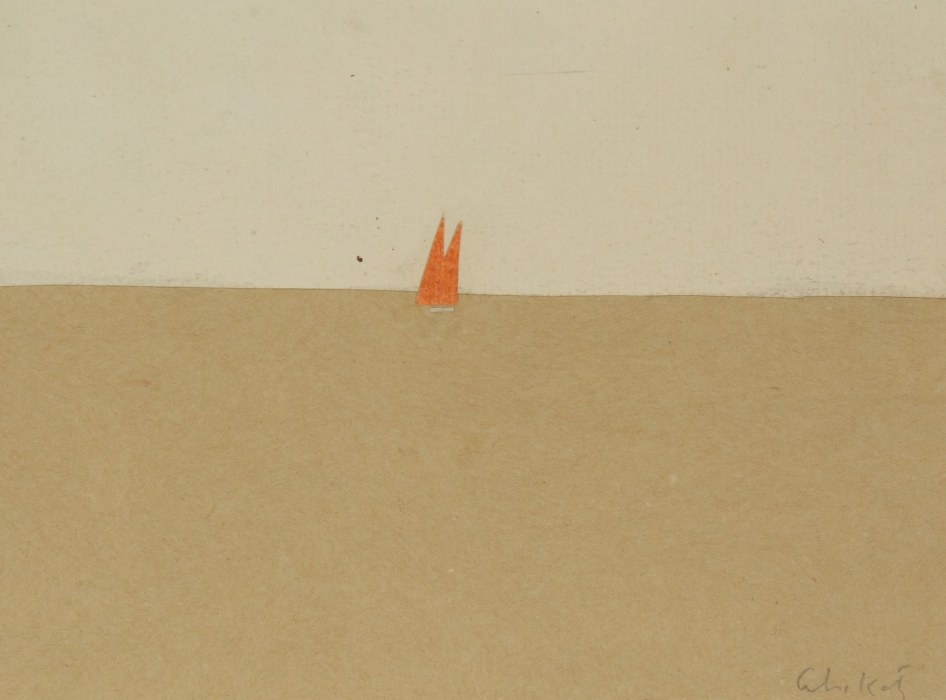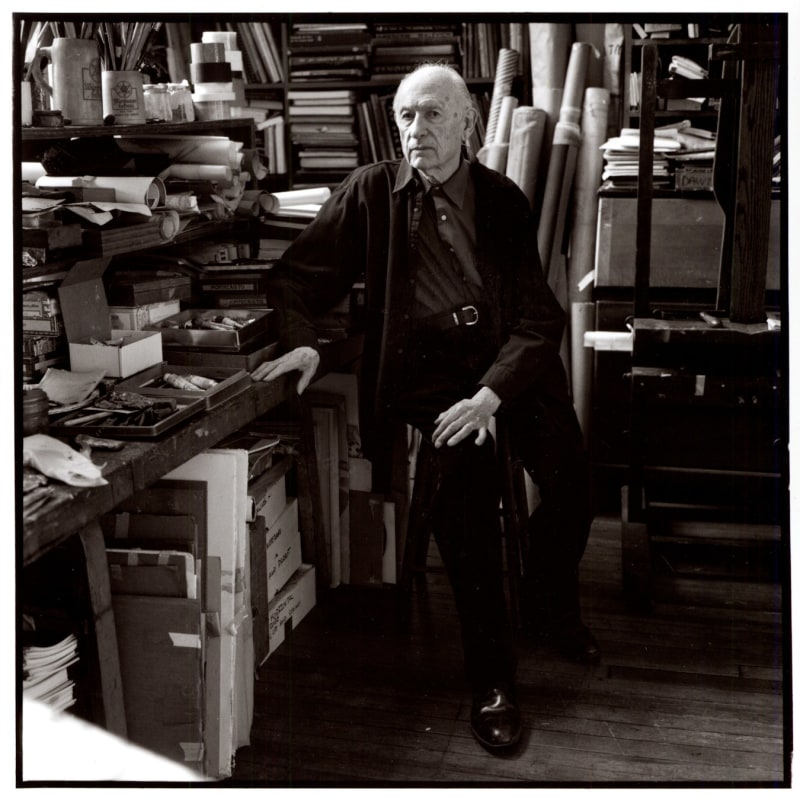

Will Barnet, 2000. Photo by Marc Royce.
In his nine-decade long career, Will Barnet (American, 1911-2012) created carefully structured abstract and figural works of spacious monumentality and measured intimacy, in which the natural influence of color, shape, and the compositional life of the canvas are honored. His figural work references Egyptian hieroglyphics in their seemingly rigid structure, while invoking a sense of intimacy via careful details of composition and color. His abstract paintings convey varied geometric forms premised upon the same approach to space and structure as his realism. As he wrote of his relationship to the canvas: "We must realize that the quadrangle on which we draw or paint has basic dimensions and movements. It moves structurally according to its basic architecture, and the artist builds with the horizontal and vertical within the quadrangle's architecture.”
Barnet was born in Beverly, Massachusetts, the youngest child of a large Eastern European family. During his early upbringing in the small coastal town, he forged a deep connection to the landscape, architecture, and atmosphere of New England, which he would return to throughout his career. He also studied the old masters from an early age, particularly Vermeer, whose mark is visible in the light and composition of many of his works. Barnet began his formal artistic studies at the School of the Boston Museum of Fine Arts, later moving to New York in 1931 to study at the Art Students League. He soon became the league’s official printer, and would continue printmaking throughout his career. Although his earliest work followed the trend of social realism, by the late 1940s, Cubist and other modernist experimentations gave way to an embrace of total abstraction, and throughout the 50s and 60s Barnet continued producing abstract work. In the 1960s he transitioned to the figural style for which he would be best recognized—his spacious, geometric scenes of family life (mostly his own), and portraits of pensive, solitary women in New England. Barnet would return to abstract work at the end of his life, starting in 2004 until his death in 2012.
During his long career, Barnet taught at the Art Students League, Cooper Union and Yale University. He was a member of the National Academy of Design and the American Academy of Arts and Letters, as well as a fellow of the Royal Society of Arts in London. In 2011, Barnet received the National Medal of Arts from President Obama in Washington DC.
Enclosed II, 2009-2010, oil on canvas, 39 3/4 x 26 7/8 inches
Hands, 2009, oil on canvas, 43 x 29 inches
Conversation, 2009, oil on canvas, 26 x 31 inches
Strolling, 2008, oil on canvas, 30 x 35 inches
Passage, 2007, oil on canvas, 28 x 19 inches
Gramercy Park III, 2007, oil on canvas, 36 1/2 x 29 1/2 inches
Anticipation II, 2005, oil on canvas, 50 x 27 inches
Go Go II, 2003, oil on canvas, 31 3/8 x 19 1/2 inches
The Cigar, 1988-99, oil on canvas, 30 1/8 x 45 inches
The Family, 1992, oil on canvas, 29 1/8 x 42 1/2 inches
Open Door, 1992, oil on canvas, 22 1/8 x 24 1/8 inches
Three Generations, 1990, oil on canvas, 54 3/4 x 54 inches
The Spider As An Artist, 1990, oil on canvas, 42 x 22 inches
Now And Then, 1989, oil on canvas, 53 1/4 x 45 inches
Kite Boy, 1986, oil on canvas, 65 3/4 x 59 1/2 inches
White and Yellow Top, 1986, oil on canvas, 30 1/2 x 35 1/4 inches
New England Family, 1984, oil on canvas, 61 1/2 x 55 1/4 inches
Eos, 1973, oil on canvas, 58 x 58 inches
Abstract, White & Black, 1960, oil on canvas, 48 x 42 inches
Green and Gold Space, 1958, oil on canvas, 51 x 33 inches
Will Barnet, Male and Female, 1954
Whitney Museum of American Art
Meet Will Barnet
Smithsonian American Art Museum
Will Barnet, Male and Female, 1954
Whitney Museum of American Art
Meet Will Barnet
Smithsonian American Art Museum
